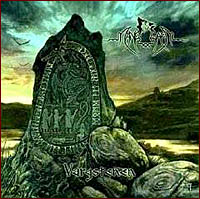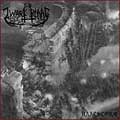MANEGARM (se) - Vargstenen (2007)

Label : Black Lodge Records / Season of Mist
Sortie du Scud : 4 mai 2007
Pays : Suède
Genre : Black Viking
Type : Album
Playtime : 12 Titres - 51 Mins
Les Vikings étaient de sacrés guerriers, mais ils aimaient aussi faire la fête. C’est d’ailleurs cet esprit festif qui domine sur Vargstenen à travers des breaks Folk et un usage assez fréquent du violon : l’auditeur est alors bien plus souvent prompt à lever le bras pour trinquer avec sa chope de bière que pour brandir un glaive ensanglanté par la bataille. Il n’empêche qu’après avoir bien mangé et bien bu, un petit pillage a de quoi vous remettre les idées en place et vous redonner l’appétit. C’est pourquoi, sur un seul titre, des blasts peuvent très bien succéder à des passages Folk, guitare sèche et violon à l’appui, le plus souvent des plus réussis, même si, affaire de goût, à l’issue des jolies interludes musicales comme « Den Gamle Talar », on souhaiterait presque entendre un Fabio Lione (RHAPSODY OF FIRE) ou encore un Hansi Kürsch (BLIND GUARDIAN) plutôt qu’un chant Death/Black, même si ce dernier se révèle inspiré et clair aussi par moments, comme le veut la tradition. La production est légère, enlevé : ces Vikings ne sont pas de ceux qui avancent laborieusement dans la neige, mais de ceux qui sont portés par le souffle d’Odin et le violon contribue à cette allégresse (« En Fallen Fader »), quand ce n’est pas la flûte (« Vargstenen »). Parfois, les assauts sont menés au pas de charge (« Genom Världar Nio », « I Underjorden ») : ne sont-ce pas d’ailleurs des hennissements de chevaux que l’on perçoit ici ou là ? Et lorsque le ciel s’assombrit pour nos Vikings (« Visioner Pa Isen »), ce n’est souvent pas bien long puisque le Folk naturaliste prend rapidement le dessus. Le problème, c’est qu’arrivé à la fin de ce périple et de ces douze compos, en sueur à avoir trop dansé la gigue, bienheureux celui qui parviendra à retenir tel ou tel morceau plutôt que tel autre. Sans doute la conséquence d’un abus de houblon...
Ajouté : Lundi 30 Juillet 2007
Chroniqueur : Le Comte de la Crypte
Score :    
Lien en relation: Manegarm Website
Hits: 14019
|














